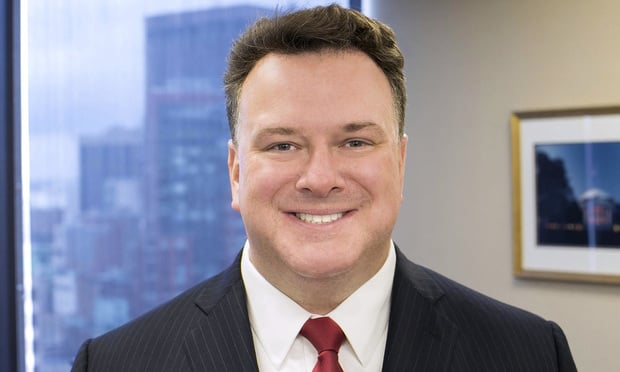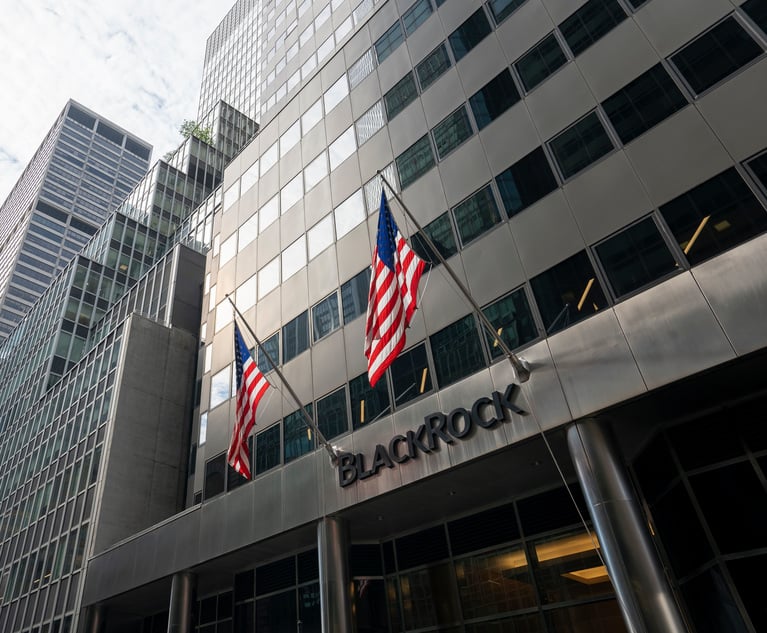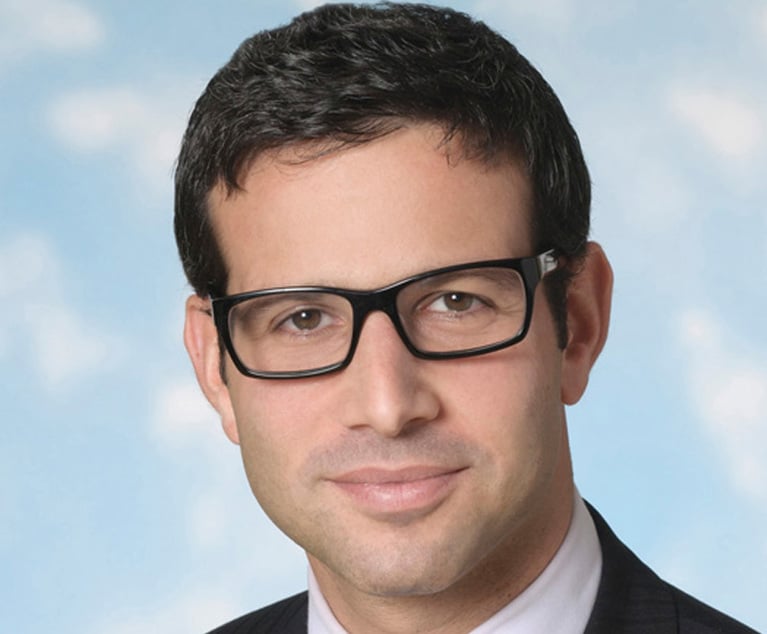New Nixon Peabody Corporate Chief Bullish on Deal Work Despite Market Jitters
Christopher Keefe, a 22-year veteran of the firm, said both his practice and the Boston legal scene are primed for growth.
May 20, 2019 at 05:00 AM
4 minute read
 Christopher Keefe of Nixon Peabody (Courtesy photo)
Christopher Keefe of Nixon Peabody (Courtesy photo)
Here's how Christopher Keefe, the newly appointed head of Nixon Peabody's corporate practice, describes last year's M&A market: “Imagine you have a really nice car, and you are driving down the road, and there is enough space for everyone. Then you pull over to get gas, and you fill up with rocket fuel and get back on the road,” he said. “That was 2018.”
There's no doubt 2018 was a good year for M&A, with deal values surging past $3.6 trillion for the year, the highest mark in a decade, according to Pitchbook.
This year hasn't started out quite as hot, at least for most. But Keefe said that, while it may not keep pace with 2018, M&A is still strong, and he expects his practice to grow. “2019 is off to a great start but without the rocket fuel,” he said. “This more of a normalized environment.”
Keefe said he felt that uncertainty over markets has led to a slower pace than last year.
“We like to price things by what we see, and right now we really can't,” Keefe said. That might not affect deal prices in the short term, he said, but could have more long-term effects, depending on tariffs and trade moves, interest rate pressures and the potential for a recession.
“There are some troubling signals and not much evidence that there is the political will or temperament to come to consensus on policy,” Keefe said. Still, he said, “I'm optimistic that dealmakers will continue to enjoy a good environment in the near future, even after accounting for challenges brought about by market uncertainty. We're focused on helping our clients achieve their goals regardless of changing conditions.”
As for his new management role at the firm, Keefe acknowledged he is younger than his predecessor, David Martland, who has been with Nixon Peabody for over 24 years. He said that the firm CEO and managing partner, Andrew Glincher, has been good about grooming younger partners to take on leadership roles.
“Demographically, Big Law has seen a degree of graying over the past 10 to 15 years,” Keefe said. “Some firms have struggled with leadership viability and development of that next set of leaders. Andrew has been smart about putting younger people in those leadership roles.”
Keefe also offered some thoughts on the Boston legal scene, which has outpaced the national growth average and doesn't show any signs of slowing down. ALM Intelligence issued a report last year showing a 79% increase in the number of firms present in Boston, as well as the entry of 26 of the largest 250 firms into the market between 2001 and 2017.
“The growth is a function of the commercial interests that have expanded or come online here,” Keefe said. “When I first started in Boston in the 1990s there were a few super-regional players, but not many national firms.” That has clearly changed.
Life sciences, biotech and other tech businesses continue to be engines for Boston's boom, with venture capital and private equity fueling and taking advantage of the region's economy. There is more legal business to be had, and growing competition to get it.
Keefe noted that some of the more recent additions to the Boston market have been taking a more aggressive approach when it comes to securing business. In the past, he said, the difficulty of breaking into the market fostered an atmosphere of co-existence. But he said that has changed recently as outside competitors have poured in, and now firms are having to fight more vigorously for business—and to foster new loyalties.
“When I came to Boston in 1997, I didn't know anybody,” he said. “The one thing I have to say about Boston is that you have to validate your relationship. You need to be somebody's “guy”. Relationships are important in Boston.”
Read More
Market Focus: As Big Law Breaks Into Boston, Midsize Law Puts Up a Fight
This content has been archived. It is available through our partners, LexisNexis® and Bloomberg Law.
To view this content, please continue to their sites.
Not a Lexis Subscriber?
Subscribe Now
Not a Bloomberg Law Subscriber?
Subscribe Now
NOT FOR REPRINT
© 2025 ALM Global, LLC, All Rights Reserved. Request academic re-use from www.copyright.com. All other uses, submit a request to [email protected]. For more information visit Asset & Logo Licensing.
You Might Like
View All
Who Got the Work: Gibson Dunn and Wilmer to Defend BlackRock in ESG Antitrust Lawsuit
2 minute read
Kirkland's Daniel Lavon-Krein: Staying Ahead of Private Equity Consolidation

Trump's SEC Overhaul: What It Means for Big Law Capital Markets, Crypto Work
Trending Stories
- 1Legal Restrictions Governing Artificial Intelligence in the Workplace
- 2Failure to Adequately Inform Patients
- 3'FTX' One Year Later: The Impact on Examiner Practice in Bankruptcy Courts
- 4Gen AI Legal Contract Startup Ivo Announces $16 Million Series A Funding Round
- 5DOJ's Flawed Thinking in Challenging HPE-Juniper Merger
Who Got The Work
J. Brugh Lower of Gibbons has entered an appearance for industrial equipment supplier Devco Corporation in a pending trademark infringement lawsuit. The suit, accusing the defendant of selling knock-off Graco products, was filed Dec. 18 in New Jersey District Court by Rivkin Radler on behalf of Graco Inc. and Graco Minnesota. The case, assigned to U.S. District Judge Zahid N. Quraishi, is 3:24-cv-11294, Graco Inc. et al v. Devco Corporation.
Who Got The Work
Rebecca Maller-Stein and Kent A. Yalowitz of Arnold & Porter Kaye Scholer have entered their appearances for Hanaco Venture Capital and its executives, Lior Prosor and David Frankel, in a pending securities lawsuit. The action, filed on Dec. 24 in New York Southern District Court by Zell, Aron & Co. on behalf of Goldeneye Advisors, accuses the defendants of negligently and fraudulently managing the plaintiff's $1 million investment. The case, assigned to U.S. District Judge Vernon S. Broderick, is 1:24-cv-09918, Goldeneye Advisors, LLC v. Hanaco Venture Capital, Ltd. et al.
Who Got The Work
Attorneys from A&O Shearman has stepped in as defense counsel for Toronto-Dominion Bank and other defendants in a pending securities class action. The suit, filed Dec. 11 in New York Southern District Court by Bleichmar Fonti & Auld, accuses the defendants of concealing the bank's 'pervasive' deficiencies in regards to its compliance with the Bank Secrecy Act and the quality of its anti-money laundering controls. The case, assigned to U.S. District Judge Arun Subramanian, is 1:24-cv-09445, Gonzalez v. The Toronto-Dominion Bank et al.
Who Got The Work
Crown Castle International, a Pennsylvania company providing shared communications infrastructure, has turned to Luke D. Wolf of Gordon Rees Scully Mansukhani to fend off a pending breach-of-contract lawsuit. The court action, filed Nov. 25 in Michigan Eastern District Court by Hooper Hathaway PC on behalf of The Town Residences LLC, accuses Crown Castle of failing to transfer approximately $30,000 in utility payments from T-Mobile in breach of a roof-top lease and assignment agreement. The case, assigned to U.S. District Judge Susan K. Declercq, is 2:24-cv-13131, The Town Residences LLC v. T-Mobile US, Inc. et al.
Who Got The Work
Wilfred P. Coronato and Daniel M. Schwartz of McCarter & English have stepped in as defense counsel to Electrolux Home Products Inc. in a pending product liability lawsuit. The court action, filed Nov. 26 in New York Eastern District Court by Poulos Lopiccolo PC and Nagel Rice LLP on behalf of David Stern, alleges that the defendant's refrigerators’ drawers and shelving repeatedly break and fall apart within months after purchase. The case, assigned to U.S. District Judge Joan M. Azrack, is 2:24-cv-08204, Stern v. Electrolux Home Products, Inc.
Featured Firms
Law Offices of Gary Martin Hays & Associates, P.C.
(470) 294-1674
Law Offices of Mark E. Salomone
(857) 444-6468
Smith & Hassler
(713) 739-1250











